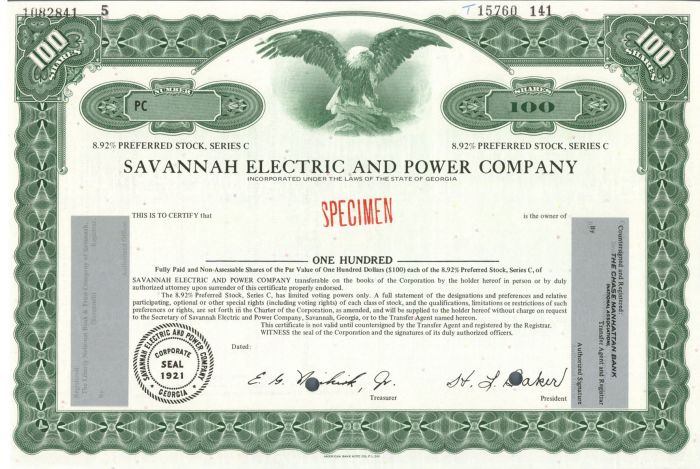Savannah Electric and Power Co. - Utility Specimen Stock Certificate
Inv# SE3188 Specimen Stock
Specimen Stock printed by American Bank Note Co., FL. Div.
Savannah is the oldest city in the U.S. state of Georgia and is the county seat of Chatham County. Established in 1733 on the Savannah River, the city of Savannah became the British colonial capital of the Province of Georgia and later the first state capital of Georgia. A strategic port city in the American Revolution and during the American Civil War, Savannah is today an industrial center and an important Atlantic seaport. It is Georgia's fifth-largest city, with a 2020 U.S. Census population of 147,780. The Savannah metropolitan area, Georgia's third-largest, had a 2020 population of 404,798.
Each year Savannah attracts millions of visitors to its cobblestone streets, parks, and notable historic buildings. These buildings include the birthplace of Juliette Gordon Low (founder of the Girl Scouts of the USA), the Georgia Historical Society (the oldest continually operating historical society in the South), the Telfair Academy of Arts and Sciences (one of the South's first public museums), the First African Baptist Church (one of the oldest African-American Baptist congregations in the United States), Temple Mickve Israel (the third-oldest synagogue in the U.S.), and the Central of Georgia Railway roundhouse complex (the oldest standing antebellum rail facility in the U.S.).
Savannah's downtown area, which includes the Savannah Historic District, its 22 parklike squares, and the Savannah Victorian Historic District, is one of the largest National Historic Landmark Districts in the United States (designated by the U.S. government in 1966). Downtown Savannah largely retains the original town plan prescribed by founder James Oglethorpe (a design now known as the Oglethorpe Plan).
Savannah was the host city for the sailing competitions during the 1996 Summer Olympics held in Atlanta.
On February 12, 1733, General James Oglethorpe and settlers from the ship Anne landed at Yamacraw Bluff and were greeted by Tomochichi, the Yamacraws, and Indian traders John and Mary Musgrove. Mary Musgrove often served as an interpreter. The city of Savannah was founded on that date, along with the colony of Georgia. In 1751, Savannah and the rest of Georgia became a Royal Colony and Savannah was made the colonial capital of Georgia.
By the outbreak of the American Revolutionary War, Savannah had become the southernmost commercial port in the Thirteen Colonies. British troops took the city in 1778, and the following year a combined force of American and French soldiers, including Haitians, failed to rout the British at the Siege of Savannah. The British did not leave the city until July 1782. In December 1804 the state legislature declared Milledgeville the new capital of Georgia.
Savannah, a prosperous seaport throughout the nineteenth century, was the Confederacy's sixth most populous city and the prime objective of General William T. Sherman's March to the Sea. Early on December 21, 1864, local authorities negotiated a peaceful surrender to save Savannah from destruction, and Union troops marched into the city at dawn.
Savannah was named for the Savannah River, which probably derives from variant names for the Shawnee, a Native American people who migrated to the river in the 1680s. The Shawnee destroyed another Native people, the Westo, and occupied their lands at the head of the Savannah River's navigation on the fall line, near present-day Augusta. These Shawnee, whose Native name was Ša·wano·ki (literally, "southerners"), were known by several local variants, including Shawano, Savano, Savana and Savannah. Another theory is that the name Savannah refers to the extensive marshlands surrounding the river for miles inland, and is derived from the English term "savanna," a kind of tropical grassland, which was borrowed by the English from Spanish sabana and used in the Southern Colonies. (The Spanish word comes from the Taino word zabana.) Still other theories suggest that the name Savannah originates from Algonquian terms meaning not only "southerners" but perhaps "salt.
Stock and Bond Specimens are made and usually retained by a printer as a record of the contract with a client, generally with manuscript contract notes such as the quantity printed. Specimens are sometimes produced for use by the printing company's sales team as examples of the firms products. These are usually marked "Specimen" and have no serial numbers.











Ebay ID: labarre_galleries